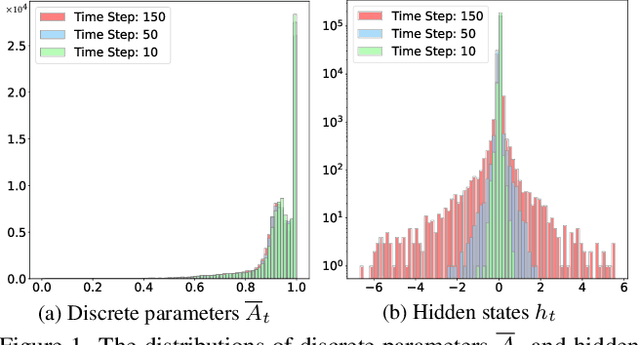Yinglong Li
QMamba: Post-Training Quantization for Vision State Space Models
Jan 23, 2025



Abstract:State Space Models (SSMs), as key components of Mamaba, have gained increasing attention for vision models recently, thanks to their efficient long sequence modeling capability. Given the computational cost of deploying SSMs on resource-limited edge devices, Post-Training Quantization (PTQ) is a technique with the potential for efficient deployment of SSMs. In this work, we propose QMamba, one of the first PTQ frameworks to our knowledge, designed for vision SSMs based on the analysis of the activation distributions in SSMs. We reveal that the distribution of discrete parameters exhibits long-tailed skewness and the distribution of the hidden state sequence exhibits highly dynamic variations. Correspondingly, we design Long-tailed Skewness Quantization (LtSQ) to quantize discrete parameters and Temporal Group Quantization (TGQ) to quantize hidden states, which reduces the quantization errors. Extensive experiments demonstrate that QMamba outperforms advanced PTQ methods on vision models across multiple model sizes and architectures. Notably, QMamba surpasses existing methods by 21.0% on ImageNet classification with 4-bit activations.
FaceCom: Towards High-fidelity 3D Facial Shape Completion via Optimization and Inpainting Guidance
Jun 04, 2024Abstract:We propose FaceCom, a method for 3D facial shape completion, which delivers high-fidelity results for incomplete facial inputs of arbitrary forms. Unlike end-to-end shape completion methods based on point clouds or voxels, our approach relies on a mesh-based generative network that is easy to optimize, enabling it to handle shape completion for irregular facial scans. We first train a shape generator on a mixed 3D facial dataset containing 2405 identities. Based on the incomplete facial input, we fit complete faces using an optimization approach under image inpainting guidance. The completion results are refined through a post-processing step. FaceCom demonstrates the ability to effectively and naturally complete facial scan data with varying missing regions and degrees of missing areas. Our method can be used in medical prosthetic fabrication and the registration of deficient scanning data. Our experimental results demonstrate that FaceCom achieves exceptional performance in fitting and shape completion tasks. The code is available at https://github.com/dragonylee/FaceCom.git.
 Add to Chrome
Add to Chrome Add to Firefox
Add to Firefox Add to Edge
Add to Edge